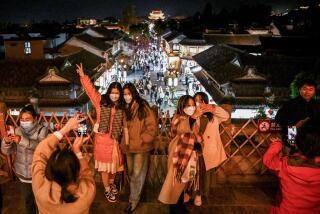Tibetan exiles in Dharamsala, India, settle in with disillusionment
- Share via
Reporting from Dharamsala, India —
Dharamsala, the Indian hill town of monks, chocolate pancakes and backpacker kitsch, has long been a mecca for Tibetans fleeing Chinese communist rule. Thousands have made the tortuous journey over the Himalayas from Lhasa, drawn by the promise of a new life, freedom of expression and the presence of their spiritual leader, the Dalai Lama, who arrived in 1959 after he fled Tibet.
But it’s also become a town of tarnished illusions, homesickness, intrigue and a more nuanced view of China than one might expect from the anti-China posters, anti-Beijing testimonials and shops claiming to shun all Chinese products.
“When I was in China, friends told me Dharamsala was a paradise, you didn’t even need money,” said Golma, 39, who uses one name. She arrived here several years ago with her husband and young daughter.
“But life isn’t easy, and this place is quite dirty,” she said, pointing to an open sewer strewn with plastic bags, animal waste and rotting vegetables. “I couldn’t believe the Dalai Lama would live in such a messy place.”
In their headlong rush for greener pastures, some Tibetans here say, they underestimated the hardship of starting anew, and even the benefits of living under Chinese rule.
Tibet has lived in the shadow of — or been outright controlled by — its powerful neighbor for centuries. Chinese troops invaded in 1950, and some exile groups continue to call for Tibetan independence.
In 2003, Tsering Dolma, like many, sneaked over the mountains from the Tibet Autonomous Region with the help of a paid guide after friends in Lhasa, the Tibetan capital, told her Dharamsala was heaven on Earth, every tree weighed down by juicy peaches, her favorite fruit.
“After I got here, I kept thinking, ‘There must be another India I’m missing,’ ” the waitress said. “Now I want to go back, but can’t. I’m stuck.”
An estimated 2,000 to 2,500 Tibetans arrive annually, and their numbers in India totaled 110,000 at the last census, in 2001. Tibetans in the country can’t vote or get a passport but are free to work and own property.
The most common problems faced by the newly arrived exiles, said Nawang Thogmed, a Tibetan government-in-exile official, include language barriers, their dislike of Indian food, and the warm weather, which makes their traditional woolen garments and yak-hide apparel uncomfortable.
Many initially live at the Tibetan Reception Center on Dharamsala’s Jogibara Road, a three-story building with chipped concrete floors, clotheslines strung like spider webs and stained yellow shelves littered with expired medicines. “Reach High, Sky Is Not the Limit” reads a poster with a picture of a red Ferrari.
Though several exiles said they welcomed India’s freedom of speech, some worried that Chinese spies in Dharamsala might report back if they spoke out, potentially endangering relatives in Tibet.
The Hindustan Times reported this month that security around the Dalai Lama had been boosted amid suspicion that Chinese spies disguised as monks were operating in Dharamsala.
Sonam Dawa, 25, a cook who has crossed the border three times, has all the proof of espionage he needs. Almost immediately after he applied for an identity card for exiles a few years ago, his parents in Tibet — who weren’t even aware he’d left — were visited by Chinese police, who accused their son of being a traitor. “It’s clear to me they have spies here,” he said.
Though Tibetans worry that China is trying to weaken Tibetan culture — a claim Beijing denies — some believe their culture is also under subtle attack in Dharamsala.
“Here we watch Indian television in Hindi or English, diluting our Tibetan,” said Lobsang Rabsel, 38, a restaurant manager and former monk who said he fled Tibet after being beaten by Chinese police. “Preserving our culture here isn’t easy, either. Not that everything about our culture is good, but as a minority we should fight to keep it.”
Nor is Dharamsala immune to cultural prejudices. Dawa, the cook, sang Tibetan opera in Lhasa, but now he finds himself excluded from local singing groups. “I know I have a good voice and dance well,” he said. “But here they say my style is too Chinese, too much like Peking opera. China has some good things, but sometimes people here think everything’s bad.”
For restaurant manager Rabsel, the ability to speak his mind far outweighs any resettlement problems. As a young monk, he saw fellow clerics beaten and tortured. He was subject to re-education sessions by Chinese security officials, who insisted that he denounce the Dalai Lama as a “cannibal” and a “wolf in monk’s clothing.”
“I couldn’t imagine staying,” he said. “If you only care about money, you can have a good life in China.”
Others, however, said most people who remain in Tibet just want to feed their families.
“China has jobs; you can start a business without a lot of bureaucracy. You don’t get Delhi belly [dysentery] all the time,” said Golma, who makes $60 a month as a Dharamsala shopkeeper, compared with $300 to $400 a month in Lhasa.
If you make a political ruckus in China you’re likely to get in trouble, added Golma, who was dressed in a traditional Tibetan chupa robe, knockoff Crocs and worn green socks. “But there’s also freedom in enjoying your life.”
Several exiles paraphrased the Dalai Lama, noting that it’s important to distinguish between the Chinese people and their government’s policies. “Both societies have good and bad,” Rabsel said.
Though China is better organized and has lifted far more people out of poverty, he said, the communist government is often extremely repressive toward the Tibetan minority. India may be bureaucratic and slow-moving, other exiles said, but its people are more tolerant.
“Superficially, everything’s better in China,” said Dawa. “But mentally, there’s also lots of pressure there. You have to think before you talk.”
He paused for a minute. “But I really miss my family. I’d like to go back if I ever get the chance.”
mark.magnier@latimes.com
Anshul Rana in The Times’ New Delhi Bureau contributed to this report.
More to Read
Sign up for Essential California
The most important California stories and recommendations in your inbox every morning.
You may occasionally receive promotional content from the Los Angeles Times.













